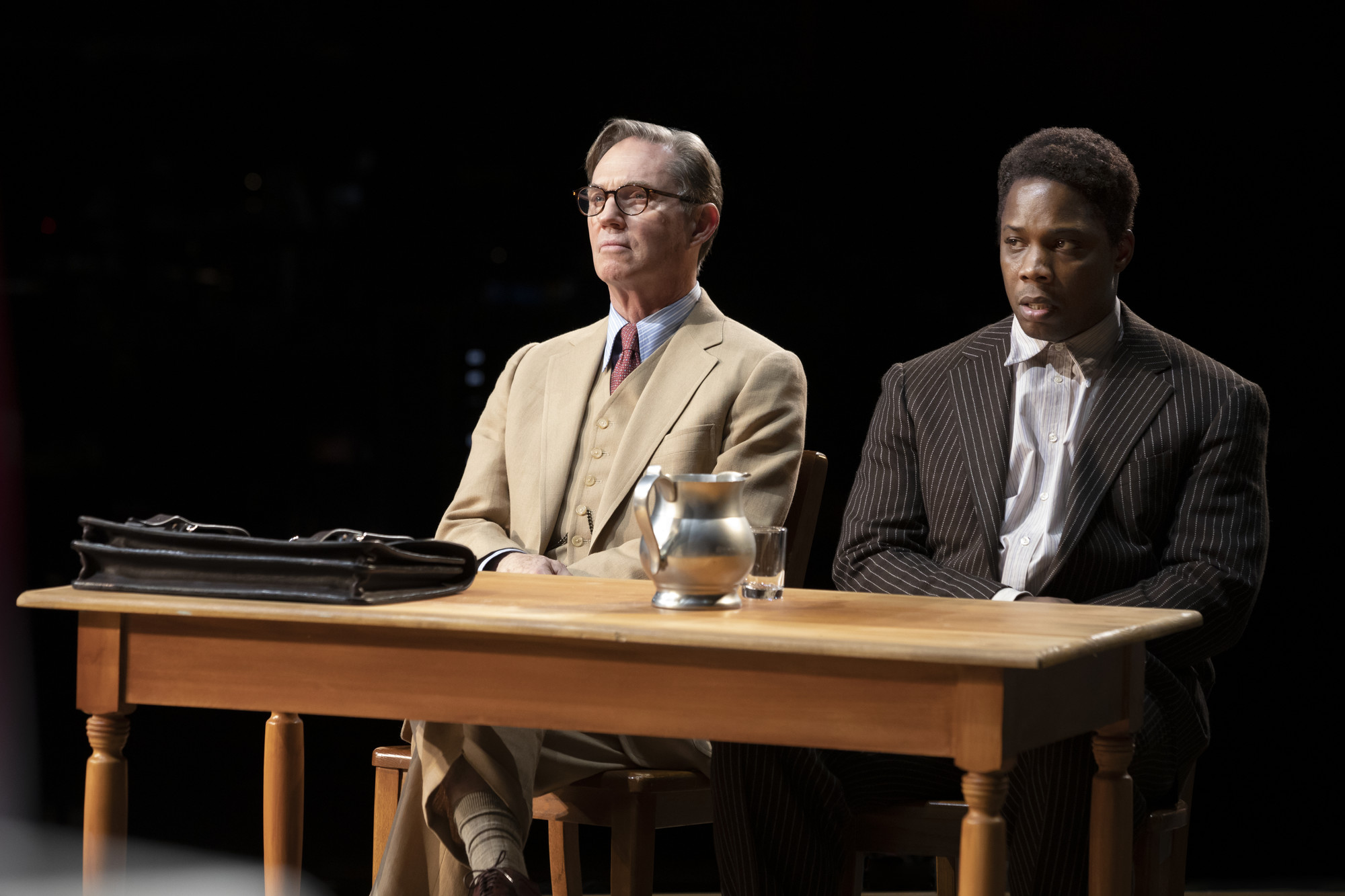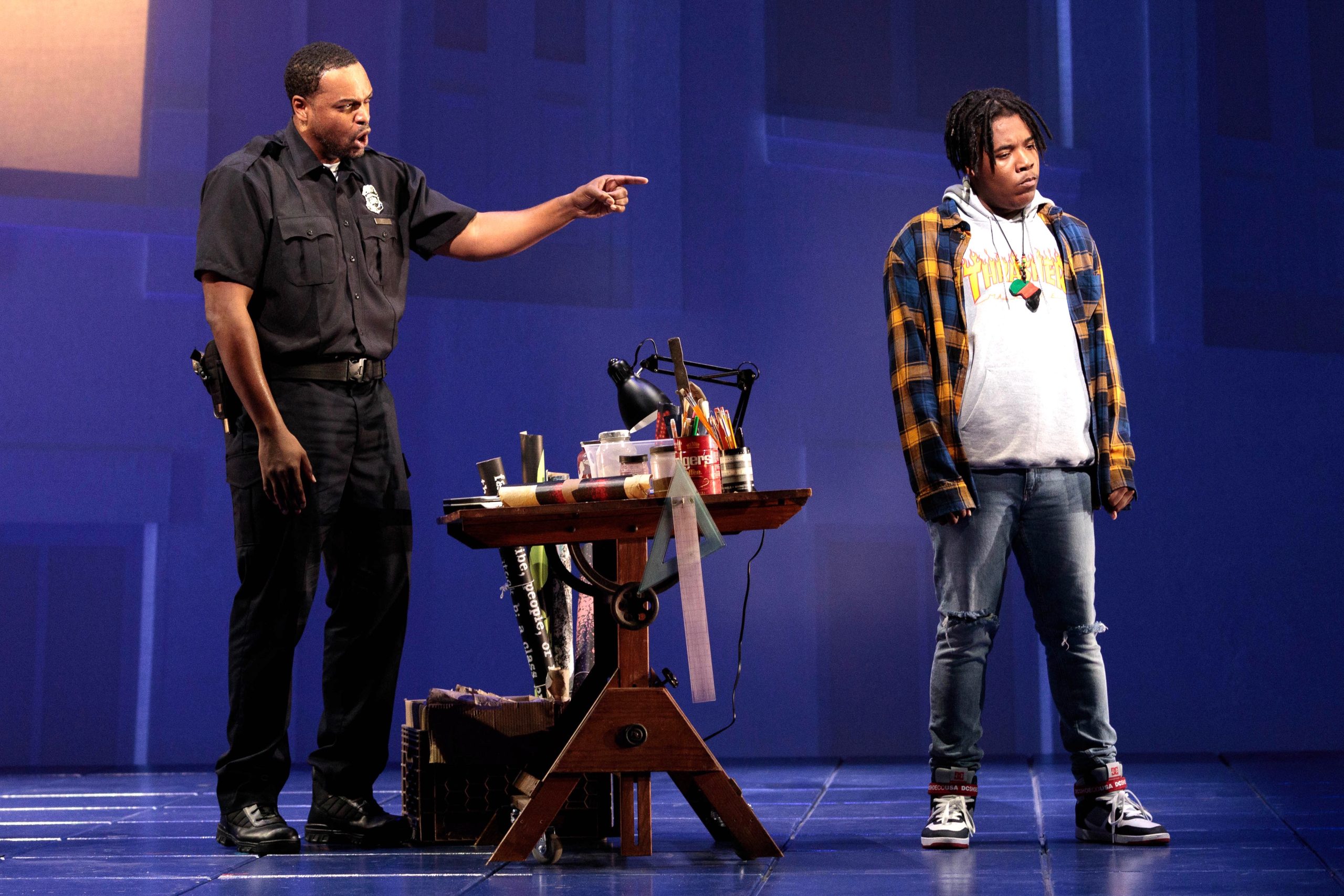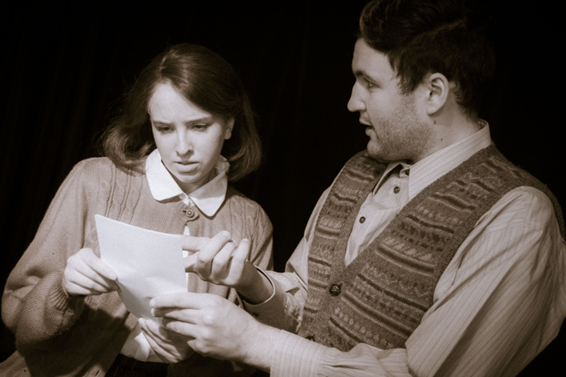April ’22 Theater Guide: Spring Breakthrough
- Like
- Digg
- Del
- Tumblr
- VKontakte
- Buffer
- Love This
- Odnoklassniki
- Meneame
- Blogger
- Amazon
- Yahoo Mail
- Gmail
- AOL
- Newsvine
- HackerNews
- Evernote
- MySpace
- Mail.ru
- Viadeo
- Line
- Comments
- Yummly
- SMS
- Viber
- Telegram
- Subscribe
- Skype
- Facebook Messenger
- Kakao
- LiveJournal
- Yammer
- Edgar
- Fintel
- Mix
- Instapaper
- Copy Link

Shakespeare’s ‘Macbeth’ had three weird sisters and so does ‘Plano’ at Quantum Theatre. The darkly bizarre comedy is a highlight of this month’s theater schedule. Playing the sisterly trio are (L to R) Moira Quigley, Julianne Avolio, and Lisa Velten Smith, while the men in their lives are Taylor Knight, Tim McGeever, and Jerreme Rodriguez. (photo: Jason Snyder)
This April shapes up as the coolest month in Pittsburgh live theater since pre-pandemic times. In addition to there being a wide selection of shows, the choices look good across the board. They range from the new Aaron Sorkin version of To Kill a Mockingbird, of which the road-show production visits here, to Will Arbery’s Plano, a surreal slice of suburban love and loopiness.
Fans of progressive musical theater may wish to double-dip, seeing both a radical show from the 1970s turned modern classic, Jesus Christ Superstar, and a more recent cult favorite: Natasha, Pierre & the Great Comet of 1812. Fans of Agatha Christie mysteries will no doubt throng to see Murder on the Orient Express, adapted by playwright Ken Ludwig. One of the world’s most renowned—and quirkiest—modern dance companies, Pilobolus, visits to perform its 50th anniversary show. And although our tradition is not to call any play a must-see, it seems hard to pass up a rare staging of Angels in America, Part One: Millennium Approaches.
Local productions also include two new shows that’ve won strong early reviews elsewhere. Both deal with urban workers and their personal lives, but from vastly different angles. Pittsburgh Opera presents the Jeanine Tesori-Tazewell Thompson opera Blue, about an African American policeman and his family facing a tragedy. Meanwhile City Theatre co-premieres The Garbologists, a seriocomedy built around two characters on a trash collection crew. Finally, online theater hasn’t gone away. The White Rose, a play about anti-Nazi resistance within Germany during World War II, streams on demand.
All are previewed below as Spotlighted shows for the month, followed by “Other Shows of Note” and brief heads-ups on big productions coming in May. Shows are listed by run dates within each category … and BTW:
Do not assume the pandemic is over and done with. Pittsburgh theater venues are still enforcing Covid precautions. See the various embedded links for details.
Entertainment Central Spotlight Picks
PLANO by Will Arbery. Quantum Theatre. April 1 – 24.
Quantum Theatre has billed its last show of the season as “an exploding tennis ball of ideas, lobbed at America.” While you recover from that metaphor, you may wish to know a little about the play called Plano. Plano, Texas is a suburban city outside Dallas and a place that inspires dueling opinions. To some, it’s the epitome of an ideal community in which to live, while others see it as an archetype of suburban angst. Will Arbery, a rising young playwright from Texas, makes it the backdrop of a surreal dark comedy. Three sisters gather on a porch, chatting about the men in their lives. One has a husband who seems an odd match for her; another has a husband who cheats. The youngest sister, a devout Catholic, intends to give her heart to the man depicted on the Sistine ceiling: God. None of this may seem radically unusual, but Plano goes beyond plain old talk. Time-shifting commences. Characters morph and multiply. Quantum presents Plano in an ad hoc theater space in Bakery Square, 192 Bakery Square Blvd., East Liberty.
ANGELS IN AMERICA PART ONE: MILLENNIUM APPROACHES by Tony Kushner. Conservatory Theatre at Pittsburgh Playhouse. April 6 – 17.

For ‘Angels in America,’ Jordan Tidwell plays a strangely conflicted woman, married to a gay man and experiencing visions. Tidwell is a student in Point Park University’s Conservatory Theatre. (photo courtesy of the university)
Those who have seen Angels in America call it one of the most profound experiences in modern theater. Tony Kushner’s epic, subtitled A Gay Fantasia on National Themes, is set in New York during the early years of the HIV/AIDS epidemic and dances between grim reality and magical realism. There are angels; there are ghosts. There is even a real-life historical figure who some might say was possessed by demons: Roy Cohn, the notoriously vindictive lawyer and political fixer, who kept his personal life in the closet and died of AIDS, claiming it was liver cancer to try to save what face he had left. Angels in America consists of two parts, which can be staged together in a nearly eight-hour marathon but are often done separately. Point Park University’s Conservatory Theatre is performing Part One, Millennium Approaches. It stands on its own as a complete play. And if Part Two, Perestroika, should appear on a future schedule, you’ll be ready. At Pittsburgh Playhouse, 350 Forbes Ave., Downtown.
JESUS CHRIST SUPERSTAR by Andrew Lloyd Webber and Tim Rice. Pittsburgh Musical Theater. April 7 – May 1.

David Toole is an ominous Judas in ‘Jesus Christ Superstar’ at Pittsburgh Musical Theater. PMT has Brecken Farrell in the title role. (photo: DNapps Productions)
When Jesus Christ Superstar opened on Broadway in 1971, it marked the converging of several new trends in rock music and theater—a convergence that ran partly through Pittsburgh. One trend was the notion that rock and Christian themes could go together. Christian rock was still a radical idea, as songs like “Why Should the Devil Have All the Good Music?” (from California rocker/evangelist Larry Norman) expressed the sentiment but didn’t chart. Meanwhile, The Who’s 1969 Tommy showed that a concept album with a narrative thread could be staged as a “rock opera.” At Carnegie Mellon in 1970, drama student John-Michael Tebelak and his mates presented the initial version of Tebelak’s Godspell—a standard musical in format, but featuring Jesus himself as a character. And by that time, two young British guys were putting the various pieces together. Andrew Lloyd Webber and lyricist Tim Rice released Jesus Christ Superstar as a concept album in 1970. Then they fleshed it out for a live U.S. tour. It premiered here in Pittsburgh—at the now-gone Civic Arena, on July 12, 1971—before a fully developed Broadway production went up later that year.
Superstar added bold new twists of its own. This rock opera put Judas at the center of a fictionalized drama depicting personal and political tensions among Jesus, his followers, and the authorities of their era. The show was a shocker in ‘71. It won no Tony Awards. But it has been playing worldwide ever since—and now Pittsburgh Musical Theater presents Jesus Christ Superstar live on a local stage. At PMT’s Gargaro Theater, 327 S. Main St., West End.
PILOBOLUS: BIG FIVE-OH! TOUR (modern dance). Presented by Pittsburgh Dance Council. April 9 only, 8 p.m.

Pilobolus returns to Pittsburgh. This is ‘the Megadrop’ from ‘Megawatt.’ (photo: John Kanebug)
Pilobolus is one of the few modern dance companies to achieve wide name recognition, and if you haven’t heard of them, the accent goes on the second syllable: PiLOBolus. Founded in 1971, at a time in the arts when weirdness was not only good but mandatory, the company has continued practicing its own particular brand. The dancers combine dance with acrobatic stunts, physical humor, and stage effects. Some critics feel the company has gotten too gimmicky, but they keep coming up with amazing new material—and whatever they do, they do extremely well. Pilobolus visits Pittsburgh to perform the company’s 50th anniversary show (delayed for one year due to Covid.) The program samples five of their signature pieces, three from the company’s early years plus two more recent: Shizen (1978), the solo from Empty Suitor (1980), Day Two (1981), Megawatt (2004), and Behind the Shadows (2021). Good seats have been going fast, so reserve promptly or try your favorite secondary ticket source. Presented by Pittsburgh Dance Council at the Byham Theater, 101 6th St., Cultural District.
MURDER ON THE ORIENT EXPRESS by Ken Ludwig, from Agatha Christie’s book. Pittsburgh Public Theater. April 13 – May 1.

Martin Giles, no stranger to detective stories, tackles a major case as Poirot in ‘Murder on the Orient Express.’ (photo courtesy of Pittsburgh Public Theater)
Great fictional detectives tend to stalk quietly onto the stage, making their presence known only with time. Sherlock Holmes’ first appearance in print was little noted; Philip Marlowe evolved gradually from earlier versions of himself; and Dashiell Hammett’s anonymous Continental Op never even acquired a name. One exception: Hercule Poirot. The cerebral Belgian became an instant star when author Agatha Christie scored a hit with her first detective novel, The Mysterious Affair at Styles. Last year, Pittsburgh Public Theater did a Pittsburgh-ized version of the novel—Tammy Ryan’s North of Forbes, streamed online—and this year, Hercule Poirot returns in the flesh, before live audiences. The Public is performing perhaps the greatest Christie mystery, Murder on the Orient Express. When a foul deed is done aboard a passenger train, it’s up to our hero to see that the wrong suspect doesn’t get railroaded. The adaptation by U.S. playwright Ken Ludwig adds humor to the situation. Martin Giles plays Poirot, accompanied by a star-studded cast of his fellow Pittsburgh-based actors. See Murder on the Orient Express at the O’Reilly Theater, 621 Penn Ave., Cultural District.
NATASHA, PIERRE & THE GREAT COMET OF 1812 (musical) by Dave Malloy. Carnegie Mellon School of Drama. April 14 – 23.
A musical based on Tolstoy’s War and Peace?!? Relax. Unlike Les Miz, which crams an entire epic novel onto the stage, this rousing show samples only one part of Tolstoy’s rambling saga. Furthermore, by mixing Slavic folk airs with indie beats and sly self-referential humor, writer-composer Dave Malloy has created what he calls an electropop opera. Natasha, Pierre & the Great Comet of 1812 became an instant cult hit when it premiered off-Broadway ten years ago. Now Carnegie Mellon’s School of Drama presents the musical free of charge, directed by Tomé Cousin with music direction by Rick Edinger. To reserve free seats, contact the box office starting at noon on the business day before the performance you wish to attend. Natasha, Pierre & the Great Comet of 1812 is in The Chosky Theater on the Carnegie Mellon campus, 5000 Forbes Ave., Oakland.
TO KILL A MOCKINGBIRD by Aaron Sorkin, from Harper Lee’s novel. Touring company at Benedum Center. April 19 – 24.

In the new ‘To Kill a Mockingbird,’ treatment of Black persons remains the central issue, but everything’s not so black and white. The touring cast has Richard Thomas as Atticus Finch and Yaegel T. Welch as Tom Robinson. (photo: Julieta Cervantes)
The acclaimed (and controversial) new stage version of To Kill a Mockingbird visits Pittsburgh in its national touring production. This play, by Aaron Sorkin, departs significantly from Harper Lee’s novel as well from the Gregory Peck movie and the pre-existing play you might’ve seen. The story is still about a Black man dubiously accused of raping a white woman in 1930s Alabama. But in Sorkin’s script, everything unfolds around the courtroom trial, with the rest of the story told in flashbacks. Defense lawyer Atticus Finch becomes a more complex character, not just a paragon of virtue, while major Black characters—defendant Tom Robinson and Finch’s housemaid, Calpurnia—are given greater voice and presence. The new Mockingbird provided plenty of work for real-life lawyers before opening on Broadway in 2018. Harper Lee’s estate sued, claiming the script altered the original tale too much. Also, in a bizarre move that created havoc nationwide, the new play’s producers threatened legal action against theater companies staging the previous adaptation by writer Christopher Sergel. The legal wrangling was a drama in itself and you can read elsewhere how things finally shook out. To Kill a Mockingbird arrives via the PNC Broadway in Pittsburgh series, with Richard Thomas as Atticus Finch. Benedum Center, 237 7th St., Cultural District.
BLUE (opera) by Tazewell Thompson and Jeanine Tesori. Pittsburgh Opera. April 23 – May 1.

Tough love turns just plain tough in Pittsburgh Opera’s ‘Blue.’ Bass-baritone Kenneth Kellogg sings the role of the policeman/dad and tenor Aaron Crouch is his son. (photo: Karli Cadel Photography)
Pittsburgh Opera, alternating classics from the repertoire with cutting-edge contemporary operas, presents one of the latter as its season finale. Blue is performed to music by Broadway composer Jeanine Tesori (Fun Home) and a libretto by playwright Tazewell Thompson, who also comes to Pittsburgh to direct. Thompson’s story, staged in episodes that span almost two decades, traces the joys and sorrows of a Black couple raising a son in modern America. The father is a police officer, a “Black man in blue,” hence the title. The son grows up to be an artistic and strong-minded teenager. And one day, while he’s taking part in a protest, a confrontation with the police turns tragic. Blue premiered at the prestigious Glimmerglass Festival in 2019. The Pittsburgh Opera cast features singer/actors who have performed Blue previously: bass-baritone Kenneth Kellogg as The Father, mezzo-soprano Briana Elyse Hunter as The Mother, and tenor Aaron Crouch as The Son. See and hear Blue in the theater at the August Wilson African American Cultural Center, 980 Liberty Ave., Cultural District.
THE WHITE ROSE by James DeVita. Prime Stage Theatre and Holocaust Center of Pittsburgh. Streamed online; viewable on demand April 24 – May 8.

Actors Julia Paul and Jared Lewis are German college students opposing the Nazi regime in Prime Stage’s ‘The White Rose.’ (photo: Laura Slovesko)
Since April is Genocide Awareness and Prevention Month worldwide, Pittsburgh’s Prime Stage Theatre has teamed with the Holocaust Center of Pittsburgh to produce and stream a play relevant to the subject. The White Rose is a fictionalized treatment of true events. In 1942, with Nazi Germany waging war on all fronts—and with the Holocaust under way—a group of students at the University of Munich organized a daring protest campaign. Calling themselves The White Rose, they printed and distributed pamphlets across Germany urging citizens to oppose the Nazi regime. Members of the core group were caught and executed, one of them after refusing an opportunity to recant. Since that time, multiple plays about The White Rose have been written and produced. Prime Stage, in keeping with its educational mission, chose one by James DeVita that is targeted to high-school-age youth and can also be appreciated by adults. DeVita’s The White Rose streams online in video-recorded form and is viewable on demand from the last week of April through the first week of May.
THE GARBOLOGISTS by Lindsay Joelle. City Theatre. April 30 – May 22

City Theatre closes its season with The Garbologists, a seriocomedy about garbage collectors, or sanitation workers to use the official term. Two such persons in New York City investigate the psychology of throwing away stuff from perspectives other than Marie Kondo’s. The two garbologists make an odd couple: One is a middle-aged, old-school white guy and the other a young, college-educated Black woman who’s new to the crew. Finding common ground isn’t on their agendas but they are liable to find it anyway. City Theatre’s production is a co-premiere with Philadelphia Theatre Company, which staged the play a few months ago to enthusiastic reviews. Playwright Lindsay Joelle says The Garbologists grew out of her desire to write a play highlighting essential workers. Joelle did first-hand research with actual sanitation crews, and one perk of attending is the opportunity to learn some of their trade secrets. See The Garbologists performed by actors Jason Babinsky and Bria Walker, with direction by Monteze Freeland. 1300 Bingham St., South Side.
Other Shows of Note
REIMAGINE (mixed-repertoire program, modern ballet). Texture Contemporary Ballet. April 1-3.
Pittsburgh’s Texture Contemporary Ballet presents a season-ending program that includes a series of excerpts from classical ballets such as Giselle and The Sleeping Beauty, reimagined and re-choreographed. A couple of Texture originals are on the bill as well and the whole show is titled, fittingly, Reimagine. At the New Hazlett Theater, 6 Allegheny Square East, North Side.
PAPA by Bailey Lee. Community Supported Art series at the New Hazlett April 7 – 8.
Actor and theater creator Bailey Lee performs a new play about her Chinese-immigrant grandfather and the family generations that followed him here in the Pittsburgh area. Lee’s Papa is described as humorous and heartfelt. New Hazlett Theater, 6 Allegheny Square East, North Side.
THE ALCHEMIST OF SHARPSBURG by RealTime Interventions. April 7 – 17.
RealTime Interventions is a Pittsburgh theater company working at the edges between theater and real life. To launch its new People of Pittsburgh series, RealTime presents The Alchemist of Sharpsburg, which highlights the “Hindu-practicing, black-metal-listening game enthusiast” known as Candra. In City Theatre’s Lester Hamburg Studio, 1300 Bingham St., South Side.
THE TWENTY-SIDED TAVERN (TTRPG show) created by David Andrew Greener Laws, Sarah Davis Reynolds, and David Carpenter. CLO Cabaret. April 15 – 30.
Pittsburgh CLO Cabaret normally presents cabaret musicals. But meet the new normal: The Twenty-Sided Tavern is a TTRPG (tabletop role-playing game) presented as live, interactive theater. It’s based on the Gamiotics platform. Bring your phone and make it a smart one. In the Greer Cabaret Theater, 655 Penn Ave., Cultural District.
NEWSIES THE MUSICAL. Little Lake Theatre. April 28 – May 8.
Newsies The Musical (aka Disney’s Newsies) is drawn from the 1992 movie, in turn based on the New York newsboys’ strike of 1899, when youthful street vendors won better terms for hawking papers. It’s labor history dramatized and set to song. Little Lake Theatre presents the show at 500 Lakeside Dr. South, Canonsburg.
Big Shows on the Horizon
May 6 – 15: Tchaikovsky’s Swan Lake (Pittsburgh Ballet Theatre)
May 12 – 28: Endgame by Samuel Beckett (PICT Classic Theatre)
May 13 – June 5: Misery by William Goldman, from Stephen King’s novel (barebones productions)
May 17 – 22: Ain’t Too Proud—The Life and Times of The Temptations (PNC Broadway in Pittsburgh)
Mike Vargo, a Pittsburgh-based freelance writer, covers theater for Entertainment Central.
Share on Social Media
- Like
- Digg
- Del
- Tumblr
- VKontakte
- Buffer
- Love This
- Odnoklassniki
- Meneame
- Blogger
- Amazon
- Yahoo Mail
- Gmail
- AOL
- Newsvine
- HackerNews
- Evernote
- MySpace
- Mail.ru
- Viadeo
- Line
- Comments
- Yummly
- SMS
- Viber
- Telegram
- Subscribe
- Skype
- Facebook Messenger
- Kakao
- LiveJournal
- Yammer
- Edgar
- Fintel
- Mix
- Instapaper
- Copy Link
Follow Entertainment Central
Sign up for the EC Newsletter
Latest Stories







